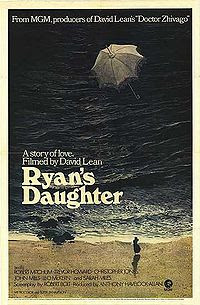
Ryan's Daughter is one of those films that has been mostly forgotten despite it being one of David Lean's strongest films. Due changing popular tastes at the time, David Lean films had become a bit passé. It came out in 1970 during the early days of the "New Hollywood" where gritty contemporary films like Easy Rider had changed the movie landscape a year earlier.
This film was the third film in a loose trilogy of personal stories taking place during World War I but doesn't directly deal with the main conflict in Europe. Lawrence of Arabia dealt with the fight with the Turks and how it reshaped the Middle East, Doctor Zhivago dealt with the Russian revolution and Ryan's Daughter deals with Ireland on the eve of its independence from England. All three stories are very personal stories on the backdrop on 3 major political shifts of the 20th century.
Loosely based on Madame Bovary, Ryan's Daughter tells the story of Rosy Ryan (Sarah Miles), a day dreaming romantic that marries the local school teacher, Charles Shaughnessy (Robert Mitchum). Her marriage is pleasant but lacks passion which leads to her having an affair with a stationed British soldier (Christopher Jones). The small Irish town figures out that she is having an affair and she is ostracized from the community, not only for breaking her wedding vows but for "sleeping with the enemy".
Ryan's Daughter was criticized at the time for telling such a small story on such a large canvas. I disagree with this assessment because it misses the entire point of the film. We are affected by our environment and our place in the world can have a direct affect on how we see it. Rosy is dreamer, so she spends most of her time on the beach reading and wandering. She rarely seen in the town itself and looks out of place when she does enter the town. The townspeople themselves are very small minded and very bored. Most of them don't ever seem to have jobs and they tend to just hang around on the main street taunting the mentally disabled, "village idiot" Michael (John Mills). The local schoolmaster is the most educated and worldly person in the village, so naturally Rosy is drawn to him. He is an outsider himself that also is rarely seen in the town and his house and schoolhouse is overlooking the Irish coastline.
The vast Irish coastline in contrast with the dirty small town is critical to the story in showing the dirty human world against the large natural beauty of the landscape. A perfect example of this are the two love making scenes in the film. During Rosy's honeymoon night with Charles, it takes place in grungy room above the hall where the townspeople are getting drunk and dancing below. It illustrates not just the lack of passion but also Rosy's realization that her marriage to Charles won't escape her to another world and that she is stuck as she ever was. In contrast to this, her encounters with the British soldier are almost always outside and the first time they make love it is in woods surrounded by nature.
John Mills' portrayal of Michael won him the Best Supporting Actor Oscar that year, but to me the most fascinating character is of Father Hugh Collins played by Trevor Howard. Alec Guinness was suppose to be the first choice for this role but I think Trevor Howard gives such a gritty performance to this role that would have been missed if it had been played by someone else.
Father Collins is the bridge between all the worlds within this film. He is equally comfortable on the beach looking for Rosy or in the town breaking up a fight. His preaching style is on one of a street thug. He knows how simple the townspeople that he serves are and he knows that slap to the head it the easiest and quickest way to knock some sense into them. When he learns of Rosy's betrayal to her husband he doesn't react in judgment but in sadness. These little touches make for fascinating viewing and one of the great pleasures of this film is seeing the priest react to these different situations.
The background of the story of Ryan's Daughter is of a small group of IRA fighters that are in the town to gather arms from a shipment that had been washed ashore. The townspeople get directly involved with the rescue of the arms. When it foiled by the British they blame Rosy and assume she is British spy. The pageantry of the rescue of these arms is critical to the story because it puts you in the point of view of how the villagers must have felt by shaking away their boredom and has given them purpose for the first time in their life. Their anger towards Rosy isn't just about adultery or treason. She (according to them) has taken away their meaning and purpose in life - which in itself was what Rosy was looking for all along too.



